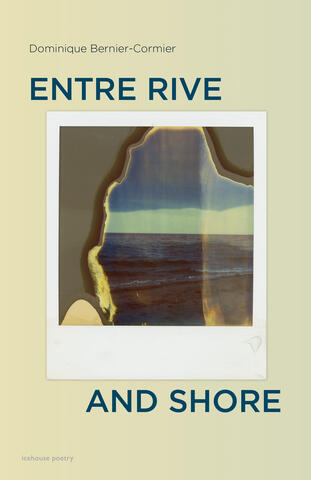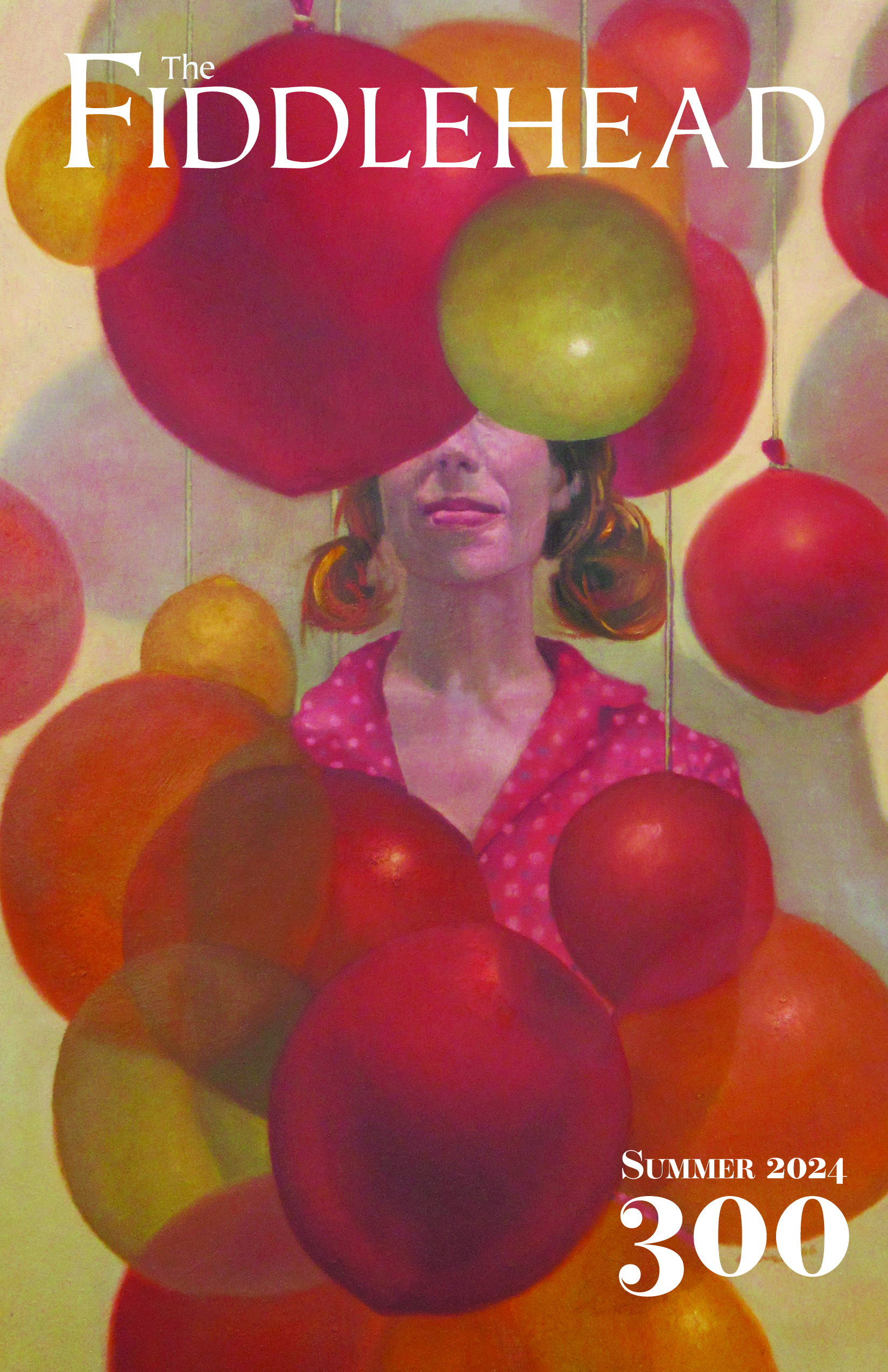
To kiss the hybrid future à travers un voile
Entre Rive and Shore, Dominique Bernier-Cormier. icehouse poetry, 2023.
Tout d’abord: wow. These were the first words that came to mind en mijotant sur how and where to begin a review of Dominique Bernier-Cormier’s multigenre, multi-temporal and dimensional, highly allusive, bilingual+ Entre Rive and Shore. “I used to think this was a book about disguise, but now I know that it’s a book about translation,” the author states in the first of several mini-essays, commentaries, and correspondences interspersed between poems. The whole may be all too easily summed up as a collection reflecting on one family’s history, how it was shaped by a violent past, i.e. the Acadian deportation of 1755, and how this history is reflected in their relationship to and use of language today.
Mais non, it’s more than that, a lot more, because toute de suite nous sommes plongés parmi des questions épineuses: what is language, what is translation, what are words, and what is their relationship to consciousness and culture? No simple or pat answers are on offer here, and that is part of the collection’s strength. It works through these questions, turns them over, reflects, shares those reflections, and leaves us all the more awake to language as a tool, a technology, a system that all too often evades and obscures even as it seeks to communicate and bridge. The effect is that of a linguistic and philosophical puzzle-box that rewards, almost insists upon, close attention and rereading.
For all that this may be a book about translation, Bernier-Cormier does not do the work of translation for the reader. Passages in each language are left largely untranslated. For bilingual readers, this poses no issue and adds to the overall experience of the book. For unilingual French or English readers, however, the challenge is clear: how do you navigate between languages? Unilingual readers: I promise you it is a worthwhile undertaking.
Shifting between poetry and prose, even as he shifts between French and English, hybridity pulses between and through the book’s interlaced cruxes. We are given correspondence between the author and his father, as well as numerous “Translation notes” sharing the author’s process. These notes offer the reader a comb with which to work out the tangles that form as French and English combine, split, and recombine as we engage avec “chaque mèche,’’ each lock of hair, each line, each rhyme.
As someone who also grew up feeling torn — or at least see-sawed — between two languages, I was grateful for the collection’s formal and linguistic complexity, for the recognition that when it comes to Acadian history, it’s easy to feel “we’ve heard it all before,” and as for the past, “il rejoue une fois à l’heure anyway,’’ yet there is so much there still to unearth: loss, evolution, reclamation.
In his notes, Bernier-Cormier clarifies that “Despite what it looks like, this book wasn’t written in English. This is a translation, interrompue.” He describes the project as “A text stuck entre deux langues, two shores, / a dark harbour ou un
navire fait escale between tongues.” Later he writes, “translation is an inherently violent process: a forceful cleaving of meaning from words, a ripping of sense from its home.” He recognizes that both French and English are the languages
of conquering, colonizing nations. Crucially, the notes remind us that Acadian settlers had already distorted the Mi’kmaw -a’kati’ in naming the land Acadie.
“Regardless of whether I write in French or English I am writing in
a language of displacement, of erasure. To insist too heavily on the
borders between these languages is to recognize their claims to the
land.”
While Bernier-Cormier refuses to be “un garde at the borders of language,” a message from his father reminds us of the pressure — political, cultural, personal, familial, emotional — francophones feel to keep French alive in a culture brimful of English.
Alors, faut virer de bord, retourner au début, back to the beginning. The book opens with a poem, en français, entitled “Source,” axed around the August night in 1755 when Bernier-Cormier’s ancestor, Pierrot Cormier, disguised himself as a woman by wearing a dress given to him by his wife. This disguise enabled him to escape Fort Beauséjour and deportation. What does the dress symbolize? By book’s end, Bernier-Cormier provides us with an answer that suggests a world of liberating possibilities.
“Source” appears repeatedly, in various iterations, in a series of interspersed visual poems and more seemingly straightforward translations, leading to a final, fully-realized hybrid French and English version. To get there, Bernier-Cormier does violence to “Source,” depicting it as split by a rift, as an erasure poem, as having the stream of another language running through it, as costume, as fabric or tissue, words he meditates on in one of his notes: tissue (tissu in French) conveys one thing, fabric another: both have their strengths. The reader is invited to weigh the meanings and allusions coiled and woven through every word. “To translate,” says the author, paraphrasing Anne Michaels in his “Self-Portrait as Pythia,” “is to kiss through a veil,” centring the question of “untranslatability” before explicitly asking, in his notes: “What does it mean to live in the space between languages?”
En parlant de the space between: I had a vague sense, early in my reading, that parallels were being drawn between the quantum realm and language. I wasn’t sure. Bernier-Cormier does not use the word quantum, never makes this implication tedious or explicit. Nevertheless, we soon encounter the poem “LIGO,” the acronym for the Laser Interferometer Gravitational- Wave Observatory in Livingston, Louisiana, braiding an element of physics, of macro and micro forces and influences, into the collection. The author visited this observatory on a trip to Louisiana with his father, “to explore that future we barely missed,” chronicled in the poem “A Future Don’t On Se Souvient Déjà,” which aside from beautifully launching the book on its trajectory, is full of gorgeous, arresting lines:
of the water, their gothic roots
like tendons in wrists. The tinsel
curtains of Spanish moss
litter the surface like discarded pompoms
Beyond its philosophical heft, the collection teems with such well-wrought lines and images and is chock full of lyrical passages on unruly weather, storms, climate, gender, liminality, change. The poems are particularly exciting and
surprising when Bernier-Cormier blends French and English seamlessly, as in one of several poems entitled “Hybrid/e:”
Ce que j’essaye de dire is that I’m trying
to look my myths en pleine face,
the silt of it dans les cils.
The best surprise, for me, was a discussion of Chiac, “a blend of Acadian French and English, unintelligible to the majority of both French and English speakers,” embedded in a poem titled “On Young Thug, Mumble Rap, and the Future of Language.” Pour moi, as for the poet’s father, growing up, Chiac often felt like a “jail,” an embarrassment. Des fois, ça me donne still mal aux oreilles, but having begun to work it into my own writing, accepting that it is part of my voice, makes me grateful for Bernier-Cormier’s assertion that far from “the crumbling castle of French falling into a sea of English,” Chiac is “a living thing, growing gills, a voice from the future, prophetic and clear.” There is surprise, unexpectedness, and joy in this, lending strength to his argument that the “future is hybrid.”
Entre Rive and Shore is a valuable example of how we might create that future, how poetry might contribute. Hybridity is only the beginning. The journey entire vaut bien, bien plus que la peine.
— Jennifer Houle is the author of two award-winning poetry collections and is currently at work on a chapbook that will also live between two langues.
You can find this review among others in Issue 300 Summer Fiction 2024. Order the issue now:
Order Issue 300 - Summer Fiction 2024 (Canadian Addresses)
Order Issue 300 - Summer Fiction 2024 (International Addresses)











